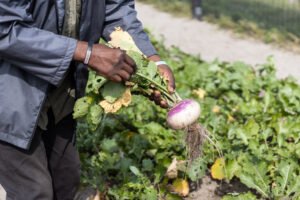
Photo: Ashraf Hendricks/CoE-FS.
“Food security at a tipping point; are we heading for ‘Zero Food’?”.
That was the question that co-director of the DSI-NRF Centre of Excellence in Food Security (CoE-FS), Professor Lise Korsten, posed at the University of Pretoria’s first Faculty of Natural and Agricultural Sciences’ Research Symposium.
In an era characterised by a growing global population and climate uncertainties, ensuring food security has emerged as a major challenge. On 30 August 2023, Professor Korsten shared the podium at a session on “Food Systems and Security” with Dr Colleta Gandidzanwa, CoE-FS principal investigator (PI) Professor Naushad Emmambux and Dr Selma Karuaihe. The session was chaired by Dr Marinda Visser.
Professor Korsten, who is also the CoE-FS PI on Food Safety, focused her contribution on the critical discussions about food security and its imminent challenges.
Her presentation was a timely exploration of the fragile state of global food security and the potential consequences of inaction. Addressing an audience of researchers, academics, and enthusiasts in the field of natural and agricultural sciences, Professor Korsten’s insights provided valuable perspectives on the intricate web of factors impacting food security.
Understanding the urgency
Setting the tone for her presentation, Professor Korsten emphasised the urgency of addressing food security concerns.
“The challenge,” she said, “is to create climate-resilient, safe, nutritious, sustainable food systems, and to transform the food system to systematically eradicate hunger, reduce waste and losses, and address food security for all.”
She reminded the audience of two significant works which carry sobering messages for the current crises: the documentary An Inconvenient Truth (2006), and “Tipping Points” and “Planetary Boundaries” by Johan Rockström.
The messages contained in these documentaries and frameworks emphasise the need “to be active and engage in the … food future that we want,” said Professor Korsten.
“Unless there’s food on everyone’s table, we will not have a secure future.”
Fresh from a conference in Paris, Professor Korsten pointed out that with the multifaceted challenges posed by climate change and limited resources, the need for a robust and sustainable food system is more pressing than ever.
“Globally, an 11% population growth is expected in the baseline, but agricultural production needs to exceed current levels by 61% to achieve Zero Hunger in 2030,” she said.
Tipping point
A central theme of Professor Korsten’s talk was the notion of a “tipping point”. She posited that the global food system is standing on the brink of a significant transformation. This juncture could mark a catastrophic breakdown in food production and distribution due to various factors, including climate-related disasters, resource depletion, and geopolitical instability.
Conversely, the tipping point could herald a positive revolution driven by innovative technologies, policy reforms, and a shift towards sustainable practices.
She made specific references to two tipping points: climate change and social tipping points. Concerning the latter, she pointed to research which suggested that a “sufficiently large (25%) committed minority within a bigger group can trigger tipping points in the larger group’s social norms, causing rapid shifts in popular moral opinion”.
Innovative solutions
Amid the sobering analyses of the challenges, Professor Korsten also illuminated potential solutions to steer the food system away from disaster. She emphasised the integration of new technologies as a promising avenue.
The work being done by the CoE-FS is about stabilisation and innovation, with a focus on policy interventions, governance acceleration, innovation and communication.
In this regard, she mentioned the work that is being done around the right to food and the establishment of the Food Law Unit in the Faculty of Law at the University of Pretoria.
“Food must be available, accessible, utilisable and stable,” she said.
Collaboration emerged as another essential factor: “We need a food safety platform where scientists can sit with government, the agri-food industry, NGOs and consumers, and truly find a solution”.
She also emphasised the importance of embracing change, which included the need to adapt artificial intelligence and the development of shorter food systems.
Policy and societal shifts
Referring to One Health, an approach that recognises that the health of people is closely connected to the health of animals and our shared environment, Professor Korsten said, “food safety is part of One Health; it’s part of food security”.
“We need to develop fit-for-purpose models. We need to make sure that we characterise foodborne pathogens and focus on the water-plant-animal-food-public health nexus. We need to integrate next-generation technologies in food safety research.”
Professor Korsten’s presentation during the UP Faculty of Natural and Agricultural Sciences Research Symposium brought into sharp focus the challenges and opportunities embedded in global food security. Her examination of the challenges underlined the urgency of taking decisive action to shape the trajectory of the food system.
While the journey ahead is undoubtedly complex, her presentation also detailed a way forward: by embracing next-generation technologies, fostering collaboration, adopting sustainable practices, and implementing thoughtful policies, the world can veer away from the precipice and usher in a future where food security is a reality for all.
related Articles
Strengthening the CoE-FS legacy: celebrating a decade of excellence
The CoE-FS 10th Anniversary Symposium was held at UWC from 22 to 24 May 2024. Photo Je’nine May/CoE-FS. “The imperative…
CoE-FS 10th Anniversary Symposium – Opening session
Date: Wednesday, 22 May 2024 Time: 09h00 – 10h00 (SAST) Co-chaired by Professor Julian May (CoE-FS Director) and Professor Lise…
CoE-FS wraps up a year of engagement at Science Forum South Africa
The DSI-NRF Centre of Excellence in Food Security (CoE-FS) finished off its year of conference engagement activities at Science Forum…



